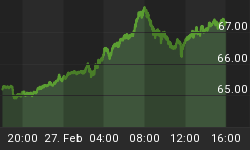The desire for higher yielding assets led traders to buy the EUR USD on Thursday. Positive economic data and signs that the U.S. economy improved helped drive investors out of the safety of the Dollar.
Better U.S. economic data and the steady rise in crude oil prices should continue to encourage selling pressure against the Dollar. The only strength in the Dollar we saw this week was following the announcement that Russia would cut its purchases of U.S. Treasuries. Barring any surprises tomorrow, look for the uptrend to continue.
On the technical side, despite yesterday's weakness, the Euro could not follow-through to the downside and challenge the two Main Bottoms at 1.3804 and 1.3791. A trade through these two prices would have turned the Main Trend down. The Main Trend remains up and by regaining the retracement zone at 1.4070 and 1.4133; this market is now in a bullish position to test the recent high at 1.4337.
Bearish traders will have to wait until this pair starts to show weakness again. Falling back below 1.4133 will be the first sign of weakness, followed by 1.4070. As long as this market remains inside of this retracement zone, it is still vulnerable to short-term corrections. The key to sustaining the rally will be regaining and holding above this zone.
Firmness in the metals complex and the strong uptrend in crude oil helped pressure the USD CAD on Thursday. Despite the strong influence from outside markets, comments from Bank of Canada Governor Mark Carney kept a floor on losses.
His primary concern is with the sharp rise in the Canadian Dollar over the past three months. The BoC is beginning to become concerned that the currency's rapid appreciation would "fully offset" any gains the Canadian economy has been experiencing.
Since the Canadian economy relies so heavily on exports, a strong Canadian Dollar may cause buyers to shy away from Canadian goods and seek cheaper prices elsewhere. This would affect the trade surplus, and hurt the economy's chances of pulling out of the current slowdown.
Looking at the charts, last week's closing price reversal bottom in the USD CAD remains intact and the possibility of a rally still exists as long as this market can hold the retracement zone at 1.1039 to 1.0980.
This zone represents the key retracement zone of the 1.0783 to 1.1290 range.
A failure to hold this zone as support should trigger a retest of the Main Bottom at 1.0783. If this market can gain support in this zone then look for the market to challenge the Main Top at 1.1290. A breakout through this level will turn the Main Trend to up for the first time since April 13.
The weaker Dollar and the strong demand for commodity-based currencies helped trigger rallies in the AUD USD and NZD USD. Additional support for the New Zealand Dollar came following the announcement by the Reserve Bank of New Zealand that interest rates would stay at 2.5%. This represented confidence by the RBNZ that the economy was in a position to recover from its current recession.
Fundamentally, news that Australia lost fewer jobs than forecast helped drive the Aussie higher in addition to the increase in trader appetite for risk.
Technically, the AUD USD is currently in a position to challenge the last Main Top at .8264 and the major Fibonacci retracement level at .8382. A trade through the Main Top will negate last week's closing price reversal top.
The current rally has helped form a new Main Trend Bottom at .7828. A trade through this level will turn the Main Trend to down.
Regaining a major 50% level at .7983 is helping to support this market. A close back under this level will indicate that the selling is greater than the buying at current levels.
Based on the daily swing chart, this market could trade as high as .8642 within the next 12 days.















